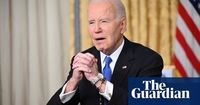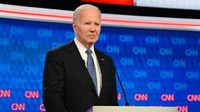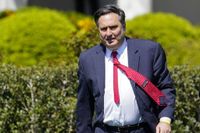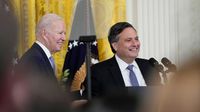In a revealing account, former Chief of Staff Ron Klain has attributed President Joe Biden’s poor debate performance against Donald Trump last summer to the negligence of senior aides rather than any personal failing on Biden’s part. Klain, who served as Biden's chief of staff from 2021 to 2023, expressed concerns that Biden was kept isolated from key domestic issues, which contributed to his lackluster showing during the debate.
Klain's comments came to light in excerpts from Chris Whipple’s upcoming book, “Uncharted: How Trump Beat Biden, Harris, and the Odds in the Wildest Campaign in History,” set to be released in the week of April 6, 2025. According to the book, Biden’s debate preparation was marked by fatigue and disengagement, with shortened practice sessions that alarmed his team.
In an interview with Politico, Klain clarified that his remarks were misrepresented by media outlets, particularly The Guardian, which described his account as painting a "devastating picture" of Biden’s mental state. Klain insisted, “I think the framing is wrong,” adding, “My point wasn’t that the president lacked mental acuity … He was out of it because he had been [sidelined], not because he lacked capacity.”
He criticized the White House team for isolating Biden from domestic political concerns, emphasizing that the president was primarily focused on managing U.S. involvement in foreign conflicts, which left him disconnected from pressing domestic issues. Klain stated, “He had been isolated from domestic politics by a WH team unplugged from Hill Dems.”
During the debate preparations, Klain noted that Biden struggled to keep up with the dialogue, often appearing fatigued and confused. Whipple’s book recounts that in mock debate sessions, Biden left early, expressing his exhaustion: “I’m just too tired to continue and I’m afraid of losing my voice here and I feel bad. I just need some sleep. I’ll be fine tomorrow.” Klain feared that the debate would be a “nationally televised disaster.”
Despite these concerns, Klain maintained that he believed Biden could have effectively governed for another four years. He expressed disappointment that Biden ultimately withdrew from the race on July 21, 2024, handing the leadership over to Vice President Kamala Harris. Klain’s comments have sparked a debate about the former president’s fitness for office, with some commentators suggesting that his admissions reflect a “dangerous cover-up” regarding Biden’s mental capacity.
Adding to the controversy, Ashley Allison, a former Biden campaign aide, voiced her feelings of betrayal upon hearing Klain’s account. In a discussion on CNN, she stated, “If the people around him knew that he was not capable, it is unacceptable to me that they allowed him to go onto that stage. I deserve better as a voter, not even as a Democrat, as a voter and as an American.”
This sentiment was echoed by Ana Navarro, a co-host on “The View,” who remarked that Biden seemed like a different person shortly after the debate. She emphasized that something significant had happened to him in the days leading up to the event, saying, “I saw Joe Biden 24 hours after that debate, and he was a completely different person.”
In the wake of the debate, Biden faced intense scrutiny and calls to step aside, which culminated in his eventual withdrawal from the race. Klain’s account has raised questions about the dynamics within Biden’s inner circle, suggesting that many of his closest advisers were in a “fog of delusion,” unwilling to confront the reality of his decline.
As the political landscape shifts, Klain's portrayal of Biden's state during the campaign may have lasting implications for the Democratic Party. The fallout from Biden’s performance and the subsequent leadership change has left many within the party grappling with the future direction and viability of their candidates.
As Biden's campaign has yet to publicly comment on the revelations from Whipple’s book, the former president is reportedly planning to publish his own account. This latest wave of literature analyzing the 2024 election underscores the ongoing interest in the factors that shaped one of the most tumultuous political races in recent history.
In conclusion, Klain’s revelations not only highlight the challenges faced by Biden during his campaign but also reflect broader concerns about the effectiveness of his leadership and the future of the Democratic Party. As the party prepares for upcoming elections, the implications of these discussions will likely resonate far beyond the immediate political landscape.








